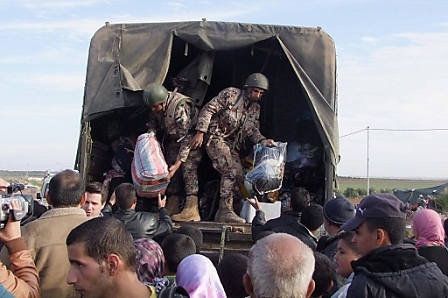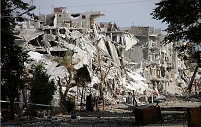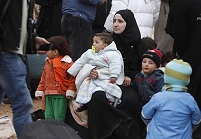Erstellt am: 29. 3. 2013 - 13:11 Uhr
"What if I were you?"
Subscribe to the Reality Check podcast and get the whole programme after the show.
I have to admit, I do suffer from large number fatigue. Wherever there is conflict, there are refugees and whether it is hundreds, thousands, hundreds of thousands or millions, the numbers quickly lose their impact. Of course, it is awful - but the scale somehow puts it at a distance - large numbers that are as remote and incomprehensible as the millions, billions and trillions of Euro or Dollars that countries and banks owe each other.
Yesterday, I had the privelidge of meeting Andrea Wagner-Hager, the director of Care Austria, who has just returned from visiting Syrian refugees in Jordan.

EPA/JORDAN ARMY
The story she told me was not just of unimaginable numbers, but of very personal details. Somehow the word "refugee" conjures up images of people driven out of their homes where they had very little, into camps where they have nothing. They leave on the spur of the moment, on impulse in the face of violent gangs or troops. But it's not always like that. Many plan their departure, most hold on to the last possible moment, and only 25% of the refugees from Syria entering Jordan end go to the refugee camp close to the border; the rest head for the cities, in the hope of finding work and a new life - as least for the time being. They are the "urban refugees", mixing with the lower levels of Jordanian society and struggling to survive.
Another misconception is that most refugees are poor. They aren't. Andrea told me about the lawyer and his family who left Syria in a good car, with money and their possessions. I imagined them living in Syria's equivalent of Vienna's 19th district: a well to do, educated, professional man and his family. On arriving in Jordan, the money soon ran out and they had to sell their car and possessions to buy food and pay rent. While the better off and better educated people may do better at first, they often suffer more in the long run. Their losses are starker and more severe than those for people who had less to start with.

EPA/SYRIAN NEWS AGENCY SANA/HO
Psychological problems are rife. With no work available in Jordan, and suddenly dependent on charity and handouts, families sit in front of televisions watching their homes in Syria being bombed out of existence. Children, traumatised by events before they left Syria, are terrified for their parents to leave the house, in case they do not come back.
Prices of everyday items in Jordan have skyrocketed. It's a simple case of supply and demand. The local economies are based on the demands of a stable population - with an influx of refugees, there is not enough to go around, and prices rise. Refugees, with no source of income, are therefore unable to afford basic food, clothing and shelter. Jordan has winter, too, and while it may not be quite as cold as Austria, it is chilly and damp. Andrea told me about visiting people living 10 or 15 to a room that you wouldn't want to stand in, let alone sleep in. The walls are damp and mouldy because they can't afford heating.

EPA/JAMAL NASRALLAH
It's a bleak and desperate picture, and Andrea says her foremost thought on meeting these people was "What if I were you?" - she calls on us all to remember that being a refugee can happen to anyone, anywhere, and it is the responsibility of global civilization to help.
Talking to Andrea the political debate of the rights and wrongs, intervention, non-intervention, government, rebels and the rest of it somehow seems so irrelevant and arbitrary. Whether a government or opposition shell destroyed your home is unimportant, the point is - it's gone, and if you've made it to Jordan, you feel lucky to have made it out with your life, even more so if your family have made it too. But life as you knew it is over, and the future holds only uncertainty.
At the end of our conversation, I fully shared in her sentiment "What if that happened to me?" and had gained even more respect for the remarkable work she and her colleagues at Care Austria and in other, similar, organisations do.
Dieses Element ist nicht mehr verfügbar
Political deadlock in Italy
Pier Luigi Bersani has failed to form a coalition government after narrowly winning last month's elections. Now it is unclear whether there will be new elections, or possibly another government of technocrats. Josephine McKenna reports from Rome on the options and the mood in Italy as the uncertainty continues.
Dieses Element ist nicht mehr verfügbar
FM4 Reality Check
Monday to Friday from 12.00 to 14.00, and after the show via Podcast or fm4.orf.at/realitycheck.


